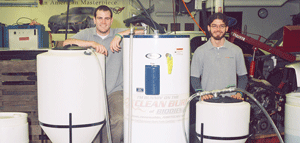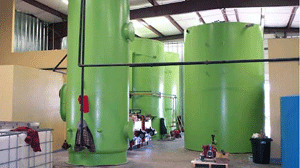Getting Down and Greasy



January 10, 2007
BY Holly Jessen
In Loveland, Colo., residents no longer have to feel guilty about frying foods in oil. While deep-fried foods may not be good for their waistlines, they now have the opportunity to recycle leftover waste oil so it can be made into clean-burning biodiesel.
The city has started to accept used cooking oil from residents at its recycling center. From there, the oil is picked up by Rocky Mountain Sustainable Enterprises LLC (RMSE), which processes and sells it to Rocky Mountain Biodiesel Industries, a 3 MMgy biodiesel plant in Berthoud, Colo.
It's a way for residents to pitch in, albeit in a small way, to protect the environment and lessen the nation's dependence on foreign oil, says Bruce Philbrick, superintendent of Loveland's solid waste division. "The most important thing is that we don't want to see it poured down the drain or dumped into the trash," he tells Biodiesel Magazine.
It also makes life easier for city workers. Dumping grease down the drain causes problems at the city's wastewater treatment facility. Setting it out on the curb with the trash isn't good either. It makes a mess when it's put in a trash compactor, and once it's in a landfill, it can contaminate groundwater.
The city's recycling center has come a long way from its humble beginnings as a drop-off center for grass, leaves and branches. Today, the center takes in a long list of items, from used clothing to batteries and appliances, Philbrick says. The facility, which has been operating in Loveland since 1991, added used cooking oil to the list of accepted items in May.
So far, the amount of used cooking oil collected at the Loveland recycling center hasn't been enough to make a lot of biodiesel. On average, RMSE picks up about one 55-gallon drum of oil every two weeks. However, as the idea starts to catch on, Philbrick expects that will grow. "We're not talking a tremendous amount of material yet, but everything we've introduced at our drop-off center has grown tremendously and we don't expect this to be any different," he says.
From Fryer to Fuel
Loveland residents aren't the only ones who benefit from RMSE's services. The company, started by father-and-son team De Wayne and Aaron Perry, collects used cooking oil from 600 to 700 restaurants, Aaron Perry says.
These restaurants are located in an area that stretches from Fort Collins in northern Colorado to Pueblo, Colo., nearly 180 miles to the south, according to RMSE Marketing Manager Adam Hall. Besides restaurants, RMSE also picks up used cooking oil from several hospitals, Invesco Field at Mile High where the Denver Broncos play and Coors Field ballpark where the Colorado Rockies play. RMSE was able to attract customers from the Denver area by offering excellent customer service and competitive prices. "Generally, we can save restaurants money," Hall says.
Some of RMSE's customers also like the fact that the waste oil they cast off is used to make biodiesel. They like being able to recycle it in a more responsible manner and to contribute, even in a small way, to the country's energy independence. "Biodiesel is definitely a buzzword these days," Hall says.
Despite the low collection figures so far, the start-up company has ambitions to develop more waste oil drop-off points similar to the one in Loveland for residents in other communities. RMSE soon plans to start picking up used cooking oil in cooperation with the city of Broomfield, which is in the metro Denver area. It's also negotiating with Eco-Cycle, which collects hard-to-recycle material in Boulder, Colo.
Oil collected from RMSE's customers is taken to the company's Berthoud, Colo., facility where it is preprocessed, Hall says. The oil is heated and filtered before being sold to nearby Rocky Mountain Biodiesel Industries where RMSE has an agreement to provide the biodiesel plant with used oil feedstock.
In Demand
The company's biggest challenge right now is keeping up with demand. At press time, about 15 to 20 customers were signing up for the service per week. "We are growing at such a pace that the routing changes day to day," Perry says. Currently, RMSE collects about 750,000 gallons of used cooking oil a year, he says. Within the first quarter of 2007, the company expects the numbers to be at about 1 MMgy.
The company's processing facility was completed about a year ago. Already, with demand rising at breakneck speed, RMSE is thinking about expanding at some point. "When the time comes, if we need to build a bigger and better plant, that's what we'll do," Hall says.
In fact, not content to be the middleman forever, RMSE is considering producing biodiesel, either in cooperation with Rocky Mountain Biodiesel Industries or on its own, Perry says. In 12 to 18 months, RMSE plans to build an integrated biodiesel facility. The company is currently analyzing its options for capacity and location. Perry says the plant would likely start out at 5 MMgy to 20 MMgy in capacity and be located in the same general area as its current waste oil preprocessing facility.
RMSE will continue to rely on waste oils as a feedstock. However, it's also looking at a multiple feedstock facility that could utilize virgin oils from crops grown by area farmers. "There are a lot of opportunities for win-win relationships as we vertically integrate in the supply chain," he says.
RMSE is also interested in zero-waste strategies. In its own biodiesel plant, RMSE may use waste gasification or anaerobic digestion to harvest additional energy for process heat, as well as additional liquid fuel inputs such as methanol or ethanol.
Holly Jessen is a Biodiesel Magazine staff writer. Reach her at hjessen@bbibiofuels.com or (701) 746-8385.
The city has started to accept used cooking oil from residents at its recycling center. From there, the oil is picked up by Rocky Mountain Sustainable Enterprises LLC (RMSE), which processes and sells it to Rocky Mountain Biodiesel Industries, a 3 MMgy biodiesel plant in Berthoud, Colo.
It's a way for residents to pitch in, albeit in a small way, to protect the environment and lessen the nation's dependence on foreign oil, says Bruce Philbrick, superintendent of Loveland's solid waste division. "The most important thing is that we don't want to see it poured down the drain or dumped into the trash," he tells Biodiesel Magazine.
It also makes life easier for city workers. Dumping grease down the drain causes problems at the city's wastewater treatment facility. Setting it out on the curb with the trash isn't good either. It makes a mess when it's put in a trash compactor, and once it's in a landfill, it can contaminate groundwater.
The city's recycling center has come a long way from its humble beginnings as a drop-off center for grass, leaves and branches. Today, the center takes in a long list of items, from used clothing to batteries and appliances, Philbrick says. The facility, which has been operating in Loveland since 1991, added used cooking oil to the list of accepted items in May.
So far, the amount of used cooking oil collected at the Loveland recycling center hasn't been enough to make a lot of biodiesel. On average, RMSE picks up about one 55-gallon drum of oil every two weeks. However, as the idea starts to catch on, Philbrick expects that will grow. "We're not talking a tremendous amount of material yet, but everything we've introduced at our drop-off center has grown tremendously and we don't expect this to be any different," he says.
From Fryer to Fuel
Loveland residents aren't the only ones who benefit from RMSE's services. The company, started by father-and-son team De Wayne and Aaron Perry, collects used cooking oil from 600 to 700 restaurants, Aaron Perry says.
These restaurants are located in an area that stretches from Fort Collins in northern Colorado to Pueblo, Colo., nearly 180 miles to the south, according to RMSE Marketing Manager Adam Hall. Besides restaurants, RMSE also picks up used cooking oil from several hospitals, Invesco Field at Mile High where the Denver Broncos play and Coors Field ballpark where the Colorado Rockies play. RMSE was able to attract customers from the Denver area by offering excellent customer service and competitive prices. "Generally, we can save restaurants money," Hall says.
Some of RMSE's customers also like the fact that the waste oil they cast off is used to make biodiesel. They like being able to recycle it in a more responsible manner and to contribute, even in a small way, to the country's energy independence. "Biodiesel is definitely a buzzword these days," Hall says.
Despite the low collection figures so far, the start-up company has ambitions to develop more waste oil drop-off points similar to the one in Loveland for residents in other communities. RMSE soon plans to start picking up used cooking oil in cooperation with the city of Broomfield, which is in the metro Denver area. It's also negotiating with Eco-Cycle, which collects hard-to-recycle material in Boulder, Colo.
Oil collected from RMSE's customers is taken to the company's Berthoud, Colo., facility where it is preprocessed, Hall says. The oil is heated and filtered before being sold to nearby Rocky Mountain Biodiesel Industries where RMSE has an agreement to provide the biodiesel plant with used oil feedstock.
In Demand
The company's biggest challenge right now is keeping up with demand. At press time, about 15 to 20 customers were signing up for the service per week. "We are growing at such a pace that the routing changes day to day," Perry says. Currently, RMSE collects about 750,000 gallons of used cooking oil a year, he says. Within the first quarter of 2007, the company expects the numbers to be at about 1 MMgy.
The company's processing facility was completed about a year ago. Already, with demand rising at breakneck speed, RMSE is thinking about expanding at some point. "When the time comes, if we need to build a bigger and better plant, that's what we'll do," Hall says.
In fact, not content to be the middleman forever, RMSE is considering producing biodiesel, either in cooperation with Rocky Mountain Biodiesel Industries or on its own, Perry says. In 12 to 18 months, RMSE plans to build an integrated biodiesel facility. The company is currently analyzing its options for capacity and location. Perry says the plant would likely start out at 5 MMgy to 20 MMgy in capacity and be located in the same general area as its current waste oil preprocessing facility.
RMSE will continue to rely on waste oils as a feedstock. However, it's also looking at a multiple feedstock facility that could utilize virgin oils from crops grown by area farmers. "There are a lot of opportunities for win-win relationships as we vertically integrate in the supply chain," he says.
RMSE is also interested in zero-waste strategies. In its own biodiesel plant, RMSE may use waste gasification or anaerobic digestion to harvest additional energy for process heat, as well as additional liquid fuel inputs such as methanol or ethanol.
Holly Jessen is a Biodiesel Magazine staff writer. Reach her at hjessen@bbibiofuels.com or (701) 746-8385.
Advertisement
Advertisement
Upcoming Events





